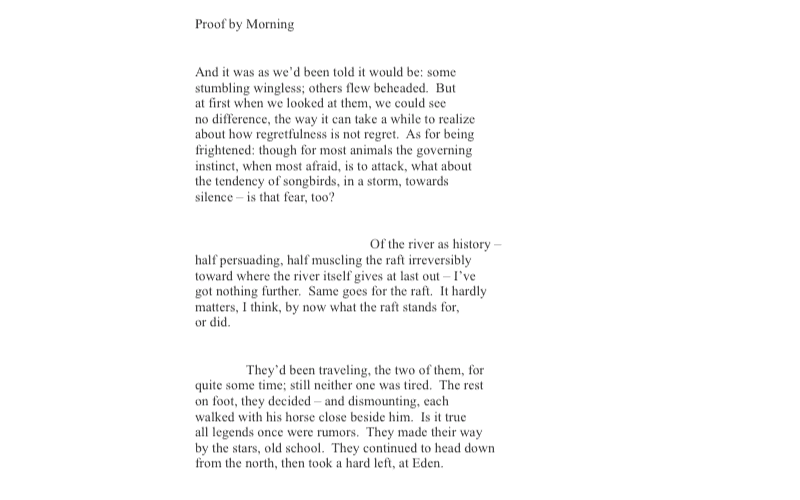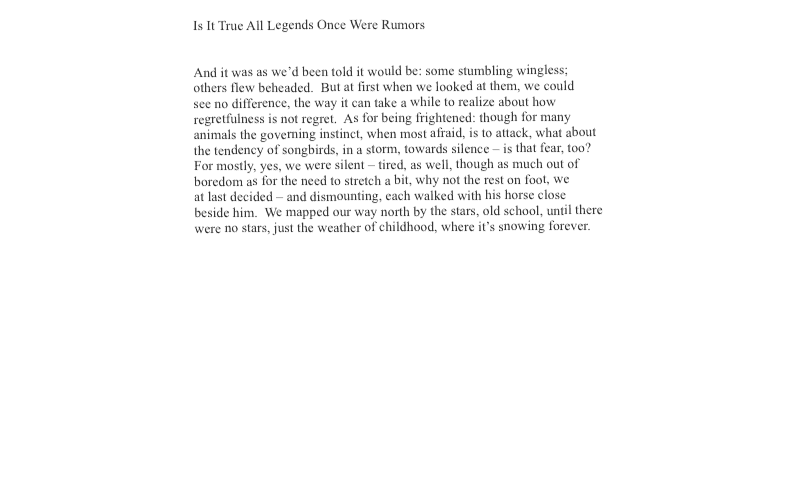

Carl Phillips is a poet known for polish. Author of more than a dozen collections, most recently Wild Is the Wind (FSG, 2018), he produces lyrics of finely-shaped syntax and exceptional command.
Reading his poetry, I’ve often wondered about his process. How does he achieve such refinement on the page? He agreed to share with me two drafts, so we could get a peek into how he edits. Our hour-long phone conversation focused on revision, as well as Eden, military bases, and his “pagan life.”
—Ben Purkert for Guernica
Guernica: Your final draft is half as long. Is this typical for you? Do you see revision as a kind of distillation?
Carl Phillips: I think writing itself is, from the start, distillation. When I write, I’m trying to distill how I need to say a thing down to the fewest and most necessary words. Usually, that has happened by the time I get to a draft, that is, it isn’t typical for me to have a draft this long that gets cut down to half its length. I suppose the original draft was as distilled as I could get, and it felt finished. But when I was looking at it a few months later, I wasn’t satisfied. I no longer saw why the middle section was needed at all. And I had a feeling that the form was another thing getting in the way of how the poem should speak. And the title made less sense to me. As you can see, I ended up using a line from the draft as the title for the final poem.
Guernica: The final version feels more intimate. What prompted the pronoun shift (from “they” to “we”), and do you frequently change perspective like this?
Carl Phillips: When I suspect that something is off, in a draft, I’ll play with what can be changed in certain fundamental ways. Verb tense is one of the main ways. Also rhythm: something will sound somehow wrong, and I’ll realize I’ve stumbled into a long string of dactyls. But I also look at point of view. As soon as I switched the point of view in this draft, I seemed to write my way into how the poem needed to end. It’s as if I had to be there, in the first person, rather than observing something from a detached distance.
Guernica: Is that maybe what a poem is? Somewhere we have to go as opposed to somewhere we’ve already been? This idea that a poem is an opportunity for us to draw closer to an experience—
Carl Phillips: Well, sometimes. I think it can work the reverse too. I often have found that I’ll be writing a poem in, say, the first person, and then it’s not working out, and it all opens up when I put it into the third person. It’s as if I needed distance to write about something as opposed to writing about this from the self. So, yeah, sometimes it’s that there’s a need to enter more intimately into it, and sometimes a need to retreat.
Guernica: Where did the new ending (“the weather of childhood, where it’s snowing forever”) come from? It’s a gorgeous image.
Carl Phillips: The ending was literally stumbled into, once I switched the point of view. I had been skeptical about the mention of Eden, since I didn’t really want any biblical reference. Or I didn’t want it to seem as if I were retelling something familiar, when in fact I just made this up. Anyway, I found my way to the weather of childhood, and from there I recalled a dream that I remember having periodically through childhood, where I’m lost on a tundra looking for my mother. That’s forever where I’m stuck, when it comes to childhood, in a never-ending snowstorm.
Guernica: Is this a literal snowstorm or a metaphorical one? I ask because I know you grew up in New England, at least for part of your childhood.
Carl Phillips: Right. It seems like it must be metaphorical because the weather of childhood… I guess that could be literal. I never really thought about it. But I probably think of it as more metaphorical in the sense of childhood being some distant blizzard that is trapped in the past. I don’t know. That whole ending surprised me. As you can see from the draft, I had some ridiculous ending about turning towards Eden. I don’t know where that came from. That biblical reference always bothered me.
Guernica: But you do make allusions to the Bible in some of your other work. I’m thinking of the poem “Parable,” for example.
Carl Phillips: It’s not so much that the problem was that it was a biblical reference, it’s that it seemed as if I was referring to a specific story from people who go east of Eden and all of that. And I thought, I’m just making this up. It’s not even real. And then, of course, there’s East of Eden, the Steinbeck, and I didn’t want it.
Guernica: Interesting.
Carl Phillips: If I’m going to refer to things that are in any way religious, I prefer for there to be some irony in there, and there didn’t seem to be any.
Guernica: Why irony?
Carl Phillips: Because, despite what some people think, I’m not a religious person. I guess I’m more interested in how people build myths and religion and ideas of faith. I’m interested in that as a concept, but it isn’t how I live my own life. I’ve had people ask was I raised Catholic, and I’m really just a heathen who happens to live literally next-door to a basilica here in St. Louis. But all that means is it’s a combination of hearing bells ringing the hours every day and, at the same time, living one’s own very pagan life.
Guernica: That leads me to ask… when you are revising, what are you faithful to?
Carl Phillips: That’s a good question. I don’t know. I guess I just think that, for one thing, there’s got to be this belief that there’s a reason to revise. There has to be a belief that what you’ve laid down as a draft has value and deserves further attention. So, maybe that’s more just a form of confidence and thinking you have something to say and how you’ve said it is unique and needs to be heard. I was speaking with one of my graduate students yesterday, and he was expressing doubt and wondering why he necessarily gets to write or should write a poem. That’s a dangerous place to be in because I think you… To me, that’s where faith comes in. You have to believe that you do have something to say.
Guernica: Do you find yourself returning to childhood, your own childhood, often in your work?
Carl Phillips: No. In fact, I never do, I rarely do. I’ve wondered why because there’s a good… Well, I guess if I went to a therapist, I could figure this out pretty quickly. I feel as if there’s a lot I could write about from childhood, and I never have. I don’t know what that’s about. Maybe in the same way that people expect…as a person of color, you’re supposed to write about certain things. I think people sometimes think, oh, if you have some particularly dysfunctional family background, why aren’t you writing a memoir or writing poems around that? But, for whatever reason, I guess I choose not to revisit it. Or it’s just not interesting.
Guernica: In your essay “A Politics of Mere Being” you reference growing up with racism. I’m curious, what was your childhood like?
Carl Phillips: I grew up on these military bases until I was in high school, all around the country, and for a while in Germany. And as I say in the essay, I had one black parent, and one white parent. My father was not an officer, but an NCO. One of the issues with that group of people is that they usually come straight out of high school, if they finish high school, and enlist. So you have a lot of uneducated people, and you also have a group of people who have been brought together, who would never choose to be together. My father had the challege of being black and having to supervise, say, some southern white men, and there was tension in that, because they hadn’t been used to having to answer to a black man. So, you have that atmosphere, and of course it includes the playground and the classroom. In that sense there was this feeling of not being accepted. Including going around the stores with my mother and everyone assuming I was adopted.
I imagine most people’s childhoods have various bad things. But also, it’s obviously the ’60s and ’70s, so we don’t have the kind of, I guess if you want to call it, “woke-ness” that there is now, and even though there’s room for things to be better, back then it was just very… I don’t know, I think racism was just a daily fact. Each time I’m moving to a different base, for example, I would immediately be put in the lowest level of classes, and it was, I think, simply because, oh, here’s a black kid. And then within weeks they’d realize, okay, we have to move him, he’s actually smart. Even things like that. And I think as a kid you just get used to… That becomes routine.
Guernica: Even the way you’re describing it—”we have to move him”—is telling. As if your ability poses an inconvenience.
Carl Phillips: Yes. And then what would happen is, I’d be moved to the advanced classes and be the only person of color in those classes, so that was a new situation. Then just combining that with moving every year, so you’re always… you don’t really have a cohort, you’re always the new kid. I don’t say any of this out of any kind of self-pity, but I can see how it’s made me socially not very trusting and more guarded and I’m prone to assume that I would be judged badly for the color of my skin. Of course, I feel like as adults we’re always really the same kid we were anyway on the playground. And it’s interesting to see how sometimes it’s not all that different in academia. It’s still easy to be the only person of color in the room and it’s still interesting to see how people have assumptions about color, even when you think everyone’s educated. In that sense, perhaps childhood was useful.
To read more interviews from our Back Draft archive, click here.
